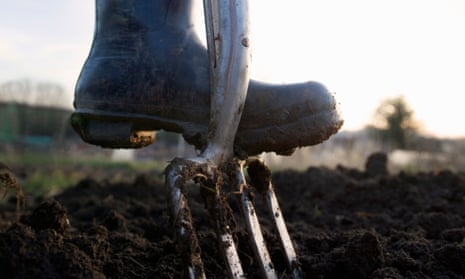My boyfriend and I are standing on a pile of manure-smelling, clay-thick earth, tentatively licking a plant root.
“Is that peppery?” I run my tongue over my teeth. “I think it might be peppery?”
“I can’t taste anything,” my boyfriend says, treading on a courgette seedling.
“Let’s take it home, anyway,” I reply, wiping muddy hands down my thighs. “We could always just boil it.”
It’s easy to be good at things: the praise, the sense of instant satisfaction, the positive reinforcement. It’s harder, and altogether more rewarding, to be bad at things.
I am really quite bad at having an allotment. We took on our 10 poles’ worth (I am told that this is a standard allotment size, dating back to Anglo-Saxon times) last winter. We weren’t the only ones. Unsurprisingly, interest in allotments soared during the first lockdown. According to the National Allotment Society, 40% of English councils reported a “significant uplift” in applications, while it experienced a 45% increase in requests for information through its website. But growing vegetables – if you haven’t done it much before – isn’t always terribly easy.
My boyfriend and I planted a couple of tomato seedlings during a hot spell in April. They were effectively burned to death in less than three days. I hadn’t thought to water them each evening, being somewhat preoccupied by watering my three-year-old son. We planted a gooseberry bush atop a red ants’ nest: tending it was both spicy on the knees and pretty pointless: the ants soon infested the root system. I cut back a grapevine left by the previous owner as the sap was rising, possibly killing off large sections. Our pièce de résistance has been the free shed a saintly member of the allotment committee members provided us. At the time of writing, the shed lists, its roof wrapped in tarpaulin and its door nailed shut in order to stop it swinging open.
There’s a guy who owns a plot two down, who got his allotment at the same time as ours. He’s already ploughed it over, producing mountains of sweetcorn, tomatoes, chard and potatoes. He built a series of metal structures, like an electricity substation, to grow beans and peas along, and scored out verges so straight you could tear paper on them. We, by contrast, have put up a large plastic children’s slide, found a rats’ nest under a pile of wood, and at one point were watering the whole thing with a child’s beach bucket.
During late summer, when we were made temporarily homeless by the madness of the British housing system and delays in a chain, we managed to grow eight pumpkins. It’s a strange thing to have no fixed abode – to be sleeping on your dad’s kitchen floor – while simultaneously owning a patch of huge orange pumpkins. We started to leave them behind as thank-you presents for people who let us house-sit. My aunt took one back to London sitting on the passenger seat of her car like a cultivated squash co-pilot.
But the thing is, I love it. I love it precisely because we’re bad at it. Everything is new; everything is an experiment; everything is hard physical work, and therefore rewarding. As I sit on an upturned bucket, drinking coffee from a vacuum flask, looking out across the tangle of weeds, I feel utterly content. Even when I’m failing. I love the pitying looks other allotment owners give us as they slowly walk past, on their way to their unbelievably fecund sites. I love that our allotment neighbours – an elderly couple who shout at each other in Urdu from either end of their plot – give us pity bunches of coriander. I love that my son can entertain himself for a few hours doing nothing more productive than cutting grass with a pair of scissors. I love it because it’s good to be bad at things sometimes. In order to learn how to do something new, you have to be rubbish at it first. You make mistakes, lose heart, forget your plans and see what works. And then, plough on.
Nell Frizzell is the author of The Panic Years

